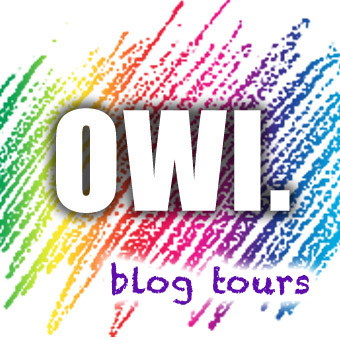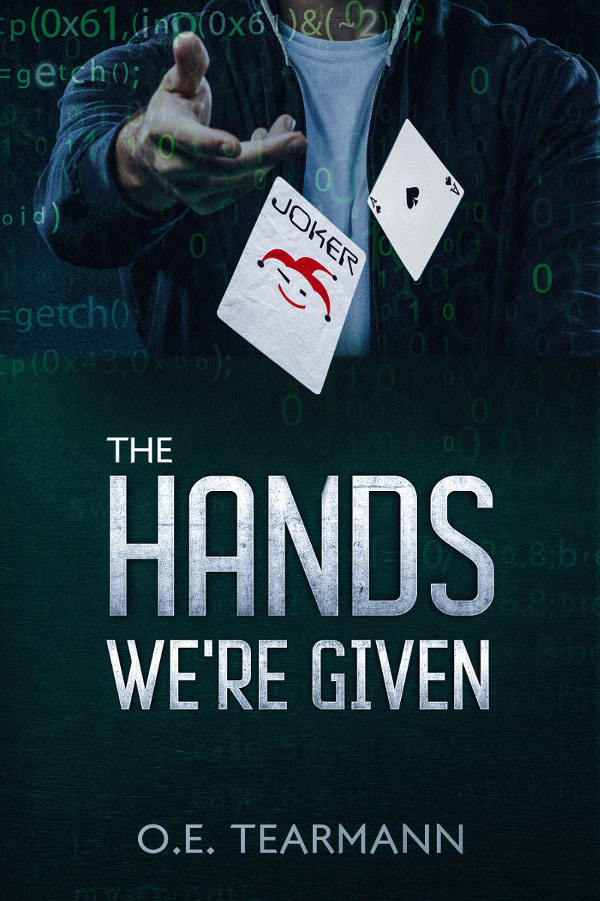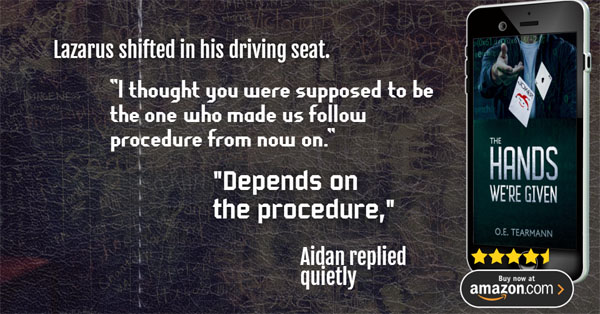O.E. Tearmann has a new MM (trans) hard sci fi/cyberpunk tale out, book one in their “Aces High, Jokers Wild” series: “The Hands We’re Given.”
Aidan Headly never wanted to be the man giving orders. That’s fine with the Democratic State Force base he’s been assigned to command: they don’t like to take orders. Nicknamed the Wildcards, they used to be the most effective base against the seven Corporations owning the former United States in a war that has lasted over half a century. Now the Wildcards are known for creative insubordination, chaos, and commanders begging to be reassigned.
Aidan is their last chance. If he can pull off his assignment as Commander and yank his ragtag crew of dreamers and fighters together, maybe they can get back to doing what they came to do: fighting for a country worth living in.
Life’s a bitch. She deals off the bottom of the deck. But you play the hands you’re given.

Symbolism in books. It’s one of the things an English teacher can beat you endlessly over the head with. Yes, sometimes the curtains really are just blue, as the joke goes.
But sometimes blue means something.
I’ve been considering the importance of symbols a great deal lately, partly because of a question from a number of readers: ‘what’s with the playing card theme? You’re writing cyberpunk. What does poker have to do with cyberpunk?’
A little bit of background: I write the Aces High, Jokers Wild series, which revolves around a unit in a resistance force in the year 2155, fighting to wrest control away from the seven Corporations that own the country and return representative democracy to the people. The unit is Base 1407, known as the Wildcards.
I’ve played heavily on the nickname and the identity: each book title references a poker term, each character has a playing card code-name, and the book art is heavy on playing card themes. Maybe folks are right. Playing cards don’t have a lot to do with cyberpunk, exactly. But they do have to do with the group cohesion of the characters. If this unit is strong, they’ll succeed. If they’re weak and divided, they’ll probably die. You could say the same thing about humanity as a whole. And that’s why symbols are so important: they are visual and conceptual banners to identify your ‘tribe’ by. Under your banner, you know you’re among your own.
Humanity has formed tribes and used tribal markers as long as we’ve been bipedal. Egypt had its proud sun disk. The European elite had their complicated charges and standards of heraldry. Their ancestors had their clan symbols: Druid, for example, comes from the Irish words Drui-vid, Men of the Oak Trees. The 8th Century Feudal Japanese had their beautiful crests.
We still use such symbolism today: tiny #resist stickers, equal signs on our cars. Crosses or crescent moons, triskelions or Stars of David. Pink kitty hats mean something very special today, and so do brand symbols on bags. Even the red, yellow and green lights adorning our streets are a form of symbolism. Those colors, in context, are the difference between order and deadly chaos.
Why are we so powerfully influenced by symbols?
Symbols are integral to one of the main functions of the human brain: taking disparate things and putting them together to form new thoughts. In a paper highlighted by The Harvard Gazette, this process was tested with the use of simple symbols.
“What we found is there are two regions in the left superior temporal lobe, one which is situated more toward the center of the head, that carries information about the agent, the one doing an action,” Frankland said. “An immediately adjacent region, located closer to the ear, carries information about the patient, or who the action was done to.” Importantly, Frankland added, the brain appears to reuse the same patterns across multiple sentences, implying that these patterns function like symbols. “So we might say ‘the dog chased the boy,’ or ‘the dog scratched the boy,’ but if we use some new verb the algorithms can still recognize the ‘dog’ pattern as the agent,” Frankland said. “That’s important because it suggests these symbols are used over and over again to compose new thoughts. And, moreover, we find that the structure of the thought is mapped onto the structure of the brain in a systematic way.” That ability to use a series of repeatable concepts to formulate new thoughts may be part of what makes human thought unique ― and uniquely powerful. (1)
Using this tool of cognition, we make our associations between symbols and emotional states, events and ideas. As we formed larger groups, this became more and more essential. Because they extend across time, space, and disparate individuals, groups need ways to articulate and maintain a stable identity that can bridge across these gaps. In the paper ‘On the psychological function of flags and logos: Group identity symbols increase perceived entitativity’ featured in the Journal of Personality and Social Psychology, it is suggested that: ‘simply having a symbol (such as a flag, logo, or even just team colors) makes groups seem more real, cohesive, and potentially intimidating to others. Moreover, at some level, group members seem to know this: Our studies show that group members tend strategically seek out symbols when they are especially motivated to convey an impression of their group as cohesive and threatening rather than inclusive and cooperative.’(2)
But you don’t need a psychologist to tell you this. Just go to a sporting event. Or a school in a bad part of town, where the kids wear ‘colors’. Or a Highlands Games, where people give each other a hard time–mostly in jest–over tartan colors. Go to a Wester Pow-Wow event, where folks of Native American descent do the same about tribal associations.
When we write fiction, this truth of human cognition is of enormous value. We can tell readers what matters and what emotions will be evident in a scene by tying them to symbols in the plot. In my own work, a black eagle evokes rage in one character and utter dread in another: they associate it with the large and implacable security corporation EagleCorp. A deft writer can draw a reader deep into the emotional content of the story through these symbols. Classics throughout time have played on this tool: Ophelia’s flowers, the bells of Sabriel, the bow of Robin Hood and the fireman’s uniform in Fahrenheit 451 all stood for something.
Currently I’m working on Book 3 in the Aces High, Jokers Wild series, hopefully slated for July and titled ‘Raise The Stakes.’ In this book, the symbolism of the playing cards underlines the connection of this team as they take on the most dangerous mission they’ve ever attempted. Giving a new member the chance to choose their own playing card and use it as a code name acts as a powerful ritual of bonding and belonging.
In my own work, I explore aspects of belonging, redemption, and acceptance through symbols. Studies have shown that belonging to groups has profound mental and physical health benefits for humans, yet we consistently create worlds that separate and isolate us. There’s a multifaceted danger in this that would take another few pages to explore properly. Let’s just say it isn’t good for anyone to feel cut off.
Belonging takes effort. It takes work to accept and find ways to harmonize with others. But having a single standard to rally around and a set of goals to work for makes this possible. In my work, that single symbol is a Joker card, and a playing card in your hand means something: A found family. Irreverent teasing. Mutual support. Love. The willingness to raise Hell and change the world for the better.
Most of all, it represents the willingness to get up and fight. Every day.
References
1)https://news.harvard.edu/gazette/story/2015/10/how-the-brain-builds-new-thoughts/
2)On the psychological function of flags and logos: Group identity symbols increase perceived entitativity. Callahan, Shannon P.,Ledgerwood, Alison Journal of Personality and Social Psychology, Vol 110(4), Apr 2016, 528-550
3)https://www.psychologytoday.com/us/blog/pieces-mind/201403/create-sense-belonging
O.E. is giving away an eBook copy of “After Hours Game: A Wildcards Christmas: with this tour – for a chance to win, enter via Rafflecopter:
The dark shapes of three drones flitted over the junkyard, blotting out the stars. Aidan desperately turned the keys, slamming his foot on the accelerator. The truck’s engine finally revved. Kevin flung open the passenger side door and leapt inside. “Go, go, go!”
Aidan slammed it into reverse and hit the gas. They jumped backward. Once the truck was far enough away from the fence, he changed gears and wrenched the wheel around. They bumped and rattled into the night as fast as Aidan dared without the headlights on. The heat of the engine would make them easy to follow for the drones’ thermal cameras, but the short-range guard drones couldn’t go too far from their base of operation before their programming called them back. Aidan just hoped they could outrun them.
He gripped the steering wheel so hard it hurt. He could feel the suit tightening down against his skin. His heart pounded in his chest. Kevin’s breathing was ragged beside him. Another burst of bullets sprayed the ground right in front of them. Aidan yelped and yanked the wheel to avoid getting hit. The truck jittered to the side. Aidan slammed on the gas. The desert night sped past in a blur of blue and red under the starlight. Slowly, the whir of rotors faded into the distance. Aidan’s grip on the steering wheel began to relax. Kevin pulled his tab out of the bag and set it on the dashboard, watching as the screen flipped through the security channels they’d hacked into, keeping track of the location of dozens of drones.
Finally, Aidan pulled up under an overhang of red rock and cut the engine. The wide-range security drones were due to make their fly-over soon. Better to stop for a while and recover, get back on the road when it was safer.
They sat in silence for a long time, listening for rotors over the quiet buzz of the night insects. Aidan rested his arms on the steering wheel and propped his chin on his wrist, watching the star-studded sky.
“You all right?” Kevin breathed. At some point during the drive, he had deactivated his slick suit.
Aidan sighed and leaned back so he could manually flip his face screen up.”Yeah. Think so. Banged my knee pretty bad. Your shoulder?”
“Bruised. Doesn’t feel severe.” Kevin shrugged.
“Um, good,” Aidan whispered eventually.
So. They were alive. They’d gotten out with most of what they’d gone in for.
At the expense of a bad bruise across Kevin’s cheek, that or worse to his shoulder, and an action that could have caused so much more.
Slowly, some of his anger seeped back. He took a breath. “You scared the hell out of me back there and acted like a complete gamma, Kev. Don’t do that again.”
Kevin ducked his head in a slow nod. “I’m sorry, Aidan. I—When I saw you like that, I guess I panicked.”
Aidan sighed. Kevin was normally so level-headed. He’d been utterly cool on-Grid, when Aidan had been scared shitless.
So why had he acted like this out here?
On the tab screen, the red dot of a drone approached their location. They waited in breathless silence as the long-range drone passed, not even the sound of whirring to announce its presence. The red dot moved out of range.
Aidan breathed out. Kevin looked up with a smile. So close. They were so close.
“That’s the last of them. A very fine night’s work if I do say so.”
Aidan tried to smile, but it faltered. “I didn’t get the holo board. That was the part we needed most.”
Kevin smirked as he pulled the bag up from the floorboard and into his lap. He rifled quickly through the materials they had managed to grab, yanked, and pulled out the board with a wink.
“Oh, I don’t know about that.”
“What? How…?” Aidan breathed, feeling the wave of defeat that had been threatening lift.
“Fell down the pile when you did,” Kevin whispered, grinning. “I simply grabbed it up. After all, I am the requisitions officer. Snatching things is my forte.”
A rush of joy shot through Aidan. They’d done it. They’d gotten everything. Nose to nose with Kevin, he grinned.
“Holy shit, we- Holy shit! You… wow. Kevin, holy shit! This is like one of your vids!”
Kevin’s eyes glittered like silver in the low light. “You know, if this is a vid, I know how the scene ends.”
“Yeah?” Aidan asked, still giddy with relief.
Kevin was still smiling, his teeth white outlines in his grin. And he was leaning closer. Aidan could feel the heat of his skin, his breath.
“Heroes always get a kiss at the end of the adventure. That’s the convention.” Kevin tipped his head, eyes holding Aidan’s. “Would the hero like a kiss?”
Aidan froze. Was Kevin actually… Was he…?
He wet his lips. His voice escaped as a whisper. “Am I supposed to be a hero?”
Kevin’s smile was soft now, and he was so very close. “I don’t see anyone else in the driver’s seat. So you must be.” Then he pressed his lips against Aidan’s.
Kevin’s lips were hot. Aidan’s brain turned inside out. Kevin was kissing him.
Kevin had started kissing him.
This was real.
He leaned into the warmth with a pleasure that was almost pain. This was only going to be a second, but if only this second would last.
Softly, Kevin drew back. “Was that okay?”
Kevin’s whisper barely made it through the buzzing in Aidan’s brain. He gasped in a breath. “Um, okay. Yeah.” He swallowed hard and forced himself to sit up. “We-we should get going home…”
Kevin nodded, eyes still holding his as he drew away. “I suppose we should.”
O.E. Tearmann lives in the shadow of the Rocky Mountains, in what may become the Co-Wy Grid. They share the house with a brat in fur, a husband and a great many books. Their search engine history may garner them a call from the FBI one day. When they’re not living on base 1407 they advocate for a more equitable society and more sustainable agricultural practices, participate in sundry geekdom and do their best to walk their characters’ talk.
Author Website: http://aceshighjokerswild.com/
Author Facebook (Author Page): https://www.facebook.com/wildcards1407/
Author Goodreads: https://www.goodreads.com/author/show/18359444.O_E_Tearmann
Author Amazon: https://www.amazon.com/O.E.-Tearmann/e/B07J62VX9W








